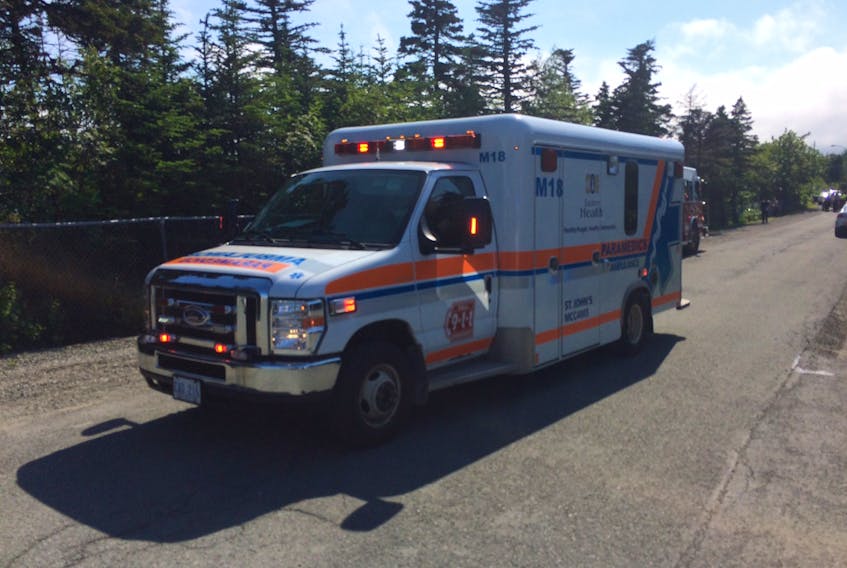Eastern Health is getting more than $500,000 to train paramedics in palliative care, but there won’t be additional paramedics hired.
The in-home palliative service — expected to be available to certain terminally ill patients in the spring — is a three-year project with national funding to set up the program. After the three years is up, Eastern Health expects to continue with minimal extra cost, as it expects not to have to add resources.
The Canadian Partnership Against Cancer and the Canadian Foundation for Healthcare Improvement (CFHI) announced Tuesday that Canadians living with cancer and other terminal conditions will gain access to urgent palliative care through paramedics trained in providing palliative and end-of-life care in the home, in consultation with other health professionals.
The organizations are funding the training of more than 5,000 paramedics through Eastern Health, B.C. Emergency Health Services, Saskatchewan Health Authority Regina Area, Interlake-Eastern Regional Health Authority (Manitoba), York Region Paramedic Services (Ontario), the Ottawa Hospital Research Institute and the New Brunswick Department of Health.
“The goal behind it is to reduce the burden of stress on the patient." — Judy O'Keefe
According to the CFHI, evidence shows that having paramedics provide palliative care and end-of-life care in the home improves comfort and quality of life for patients, as well as their families.
It also reduces the number of avoidable trips to the hospital and the use of health system resources, such as hospital beds and emergency departments and total time on a call for paramedics, the CFHI says.
Eastern Health vice-president of clinical services Judy O’Keefe told The Telegram Tuesday the project would be offered in the urban St. John’s area, as opposed to rural areas which are contracted out to private ambulance providers.
Eastern Health had submitted the proposal, and O’Keefe said the paramedic program’s director has been involved in the process.
About 80 paramedics will be trained by Eastern Health and they will treat the first patients on April 1.
Acknowledging the demands already put on ambulance services, she said paramedics often respond to calls involving patients who are terminally ill and trying to remain in their homes. The call may come from them or family members who are unsure what to do. If paramedics could provide certain services in the patient's home, it would cut down on bringing those patients to the emergency room, which is not an ideal environment for the terminally ill, O’Keefe said.
“The goal behind it is to reduce the burden of stress on the patient,” O’Keefe said. “(The ER) is not the appropriate place to provide that care. It’s not suitable to anybody having that stress. They want to be with their families at that point in their life.”
Part of the project includes setting up a special registry to identify patients in need of those services.
It’s anticipated there are about 800 palliative patients who could be treated by paramedics each year at home. Annually, Eastern Health gets 1,100 referrals for palliative care, with about 300 admitted to specialized palliative care units.
O’Keefe said there isn’t any plan to cut the number of in-patient palliative beds as a result of this project.
Rather, she said, its aim is to provide enhanced care for those who want to die at home.
Neither will Eastern Health decide where the patient gets their palliative care — at home or in hospital, she said.
“The patient will always have the choice,” O’Keefe said.
Training for the paramedics will be provided by Pallium Canada, a nationally recognized non-profit organization specializing in palliative care.
Asked about the concern of putting more workload on paramedics and the possibility of causing more red alerts — situations where ambulances are not available — O’Keefe said the major contributor to red alerts is not having beds at hospital for patients to be offloaded from ambulances, tying up paramedics’ time.
Ambulances will always respond to emergencies first — life-threatening calls — before going on other calls.
The paramedics are already being called out to homes where there are terminally ill patients — situations where someone isn’t clear how to proceed with managing symptoms or pain, for example.
Based on the work done in two other provinces, the paramedics spend about the same time on calls to a terminally ill patient’s home — roughly an hour to respond and treat a palliative patient rather than respond and transport to the nearest ER — she said.
She acknowledged there is currently a gap as the patient or their family member may not be able to access the care team, and therefore calls the ambulance for transport to hospital, whereas the paramedics would — with training — be able to treat the patient in consultation with a doctor or the care team if necessary.
The aim is to use the highly trained paramedics to help people stay at home if they wish, she said.
If there is increased demand on paramedics due to adding the service, Eastern Health would look at resources as part of the project’s review over the next few years, O’Keefe said.
The Paramedics and Palliative Care: Bringing Vital Services to Canadians collaboration will run until spring 2022. The two organizations will jointly provide up to $5.5 million over the next four years nationally to expand access to paramedics trained in providing palliative and end-of-life care to certain jurisdictions.
“A big part of achieving a more sustainable cancer system is finding ways to have vital supports provided to patients in their home and community,” Cindy Morton, CEO of the Canadian Partnership Against Cancer, stated in a news release about the funding. “Paramedics and palliative care is a big step in achieving this home-based support and we are excited to collaborate with CFHI to deliver these skills to paramedics across the country.
Similar programs are already offered elsewhere in Atlantic Canada.
“Introducing this model of care in Nova Scotia and Prince Edward Island has improved access to palliative care 24 hours a day, seven days a week across our two provinces. Paramedics feel this is some of the most rewarding work they do, and patients and families describe the relief they feel being more able to remain home with the support of this new program,” Dr. Alix Carter, medical director of Research at EHS Nova Scotia and member of the Paramedics Providing Palliative Care at Home Program team in Nova Scotia and Prince Edward Island, said in the news release.
The Newfoundland and Labrador Association of Public and Private Employees (NAPE), which represents paramedics, was unable to provide comment Tuesday.









